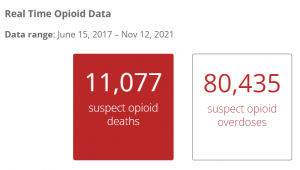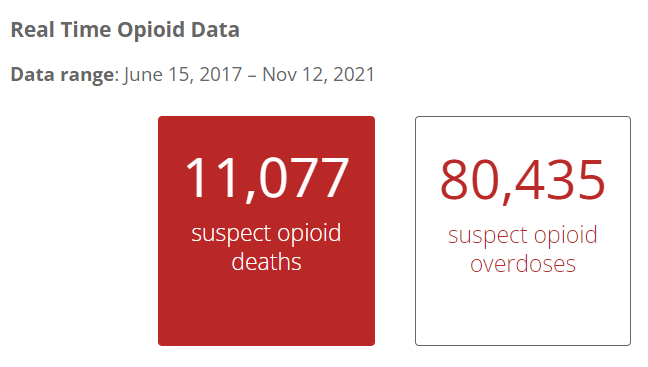 Today’s grim national news about overdose deaths amid the pandemic strikes a chord in Arizona, where opioid overdose deaths have continued to rise amid increased illegal use of counterfeit fentanyl.
Today’s grim national news about overdose deaths amid the pandemic strikes a chord in Arizona, where opioid overdose deaths have continued to rise amid increased illegal use of counterfeit fentanyl.
The National Center for Health Statistics released provisional figures showing that U.S. overdose deaths exceeded 100,000 for the first time in a 12-month period that ended in April.
In Arizona, opioid overdose deaths reached a high of 1,982 in 2020, a 45% increase from 2019. The monthly number of deaths has decreased since a high of 226 in July 2020, but it’s still too early to tell if deaths will continue to increase in 2021.
Arizona has taken strong steps to combat the opioid crisis since Governor Doug Ducey declared a public health emergency in June 2017. These include new rules for licensed healthcare facilities, pain management clinics, and sober living homes, educating healthcare providers on responsible prescribing practices, expanding treatment resources, and using an opioid surveillance system to track reported overdoses, naloxone prescriptions, and naloxone use by first responders.
However, the challenge from overdose deaths has increasingly shifted to illegal use, primarily of counterfeit fentanyl pills. Law enforcement continues to report a dramatic increase in the amount of fentanyl in Arizona. Just one of these counterfeit pills can contain a lethal dose.
Today, fentanyl is the most commonly identified substance in verified opioid overdoses. More than half of all verified opioid overdoses this year have involved fentanyl.
In addition, ongoing stress from the pandemic along with temporary closures of some facilities during 2020 may be leaving people more vulnerable to developing substance use disorders.
Two recent ADHS initiatives tackle the big social issues of isolation and stigma. Our Start a Conversation campaign takes on chronic loneliness and promotes social connection. Hope Heals aims to reduce stigma experienced by pregnant and postpartum women with substance use disorder.
The Arizona Health Improvement Plan prioritizes mental well-being strategies, including actions related to reducing overdoses over the next two years. ADHS continues to provide naloxone to community organizations and law enforcement agencies across Arizona, and will soon be funding the distribution of fentanyl test strips.
For people struggling with an opioid use disorder, there are resources available to help. The Arizona Health Care Cost Containment System (AHCCCS) recently launched an online Opioid Services Locator to help people find available treatment. In addition, the OARLine Opioid Assistance + Referral Line (1-888-688-4222) is available 24/7 to answer questions, make referrals, and provide free consultation for healthcare clinicians on patients with complex pain or opioid use disorder.
I hope today’s attention to overdose deaths prompts everyone to take a hard look at this epidemic. If you have a substance-use disorder, you are not alone and help is available. If you know someone who may have a substance-use disorder, please be the one who starts a conversation that can save someone’s life.










